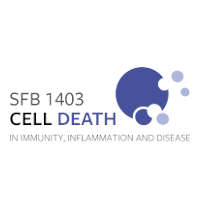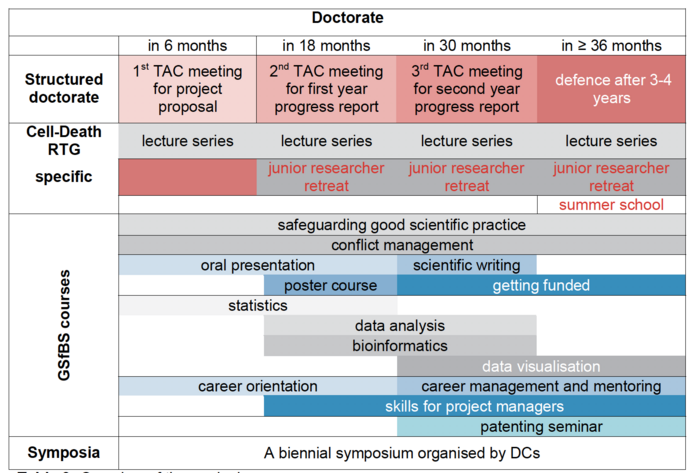Cell Death-RTG Curriculum
Thesis Advisory Committees (TAC)
PhD students within the Cell Death-RTG need a Thesis Advisory Committees (TAC):
Each PhD student will select two mentors for her/his TAC. We advise that one Mentor should be chosen from the SFB 1403 faculty and one from outside the SFB 1403 faculty but with complementary expertise. One of the mentors needs to be a university professor, the other one has to be at least an independent group leader. TAC meetings are mandatory:
- 6 months after starting to work on the projects: individual TAC meeting to present and discuss details of the prospective project (Written and oral report)
- 1, 2 and 3 years after initial project proposal: first, second and third year reports to discuss wirh the TAC members (Written and oral report)
Basic Cell Death Lecture series
The Basic Cell Death Lecture Series PhD students, Postdocs as well as bachelor/master students will acquire a sound knowledge of the molecular pathways and concepts of cell death. The rather general topics are combining the animal and the plant site of a particular cell death topic. In the third year a second lecture series with updated topics will be started. For PhD students the attendace is mandatory.
Cologne Cell Death Club Seminar series
In addition to basic lectures, PhDs and Postdocs have the opportunity to actively participate in the monthly seminar series Cologne Cell Death Club. PhDs and Postdocs can take part in the "Meet the Speakers Lunch" to discuss science and career wit hthe speakers. Furthermore a team of PhD students and Postdocs participate in the selection and invitation of the Cologne Cell Death Club guest speakers.
Postdoc mentoring program
Within the Postdoc mentoring program Postdocs are recommended to choose a second mentor besides their supervisor, ideally with complementary expertise related to their research projects, which is however not binding for the Postdocs.
- At least annually, the mentor will meet the Postdoc to discuss any scientific or other matters particularly related to provide extra guidance and support for their career development. Postocs will benefit from the Cell Death-RTG programme, the lecture series as well as from GSfBS and AMC courses and workshops
PhD & Postdoc Seminars
In order to support scientific exchange/communication PhD students and Postdoc can present their data in a monthly Seminar Series without PIs present. At the annual junior researcher retreat PhDs and PDostdocs will discuss their scientific progress in individual projects in an informal atmosphere in the absence of their advisors. The PhD students and Postdoc Committee take full responsibility for the organisation and programme of the seminar series and the retreat. You can contact the Committee here.
Scientific and transferable skill courses and workshops
The IPMM and GSfBS offer a variety of courses and workshops to foster the development of additional important skills, such as in statistics, bioinformatics and data visualisation, good scientific practice (compulsory), conflict management, scientific presentation (oral/poster), scientific writing (paper/grant application), patenting, female careers, skills for project managers, career management both for academic careers and for the wider job market.
Furthermore, PhD students and early Postdocs will also be able to join courses offered by the Albertus Magnus Center (AMC), and Human Resources (HR) Development for Researchers.
Beyond these opportunities PhD students and Postdocs will be supported to attend external practical courses, visiting labs outside the SFB, or participate in Summer Schools at Cold Spring Harbour Labs, the EMBL, or elsewhere, to acquire further skills.
Symposia organised by PhD students
Every second year, Cell Death-RTG PhDs can participate in the organisation of an international symposium together with other PhD students under the aegis of the GSfBS (For example "Crossroads in Biology (CIB)" regularly organized under the GSfBS).

